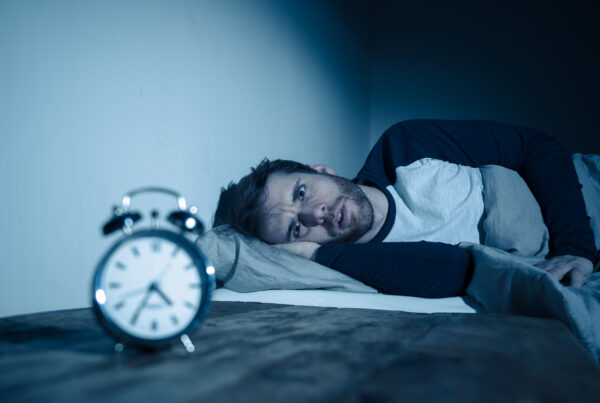”Arkansas, did you know our sleep affects our mental health and our mental health affects our sleep? You can learn more about this two-way connection in this week's article, along with suggestions for how to get better sleep. We hope you find this helpful!
Reading Time: 12 Minutes
MWi Hacks:
- Discover the role sleep plays in different areas of mental health
- Find more information on coping strategies that can be implemented today
MWi Summary:
- There is a circular relationship between sleep patterns and mental health. Issues with sleep can lead to changes in mental health, but mental health conditions can worsen problems with sleep. This means that treating disordered sleep can help improve mental health.
- Poor sleep can make it difficult to handle stress, and even if you know a good night’s sleep will make you feel better, you may be worried about falling asleep each night.
- Insomnia can be both a symptom of depression and a cause of depression. Treating insomnia can be an effective way to alleviate depression symptoms and lower risk of depression.
- People with anxiety tend to experience more sleep disturbances and sleep deprivation can increase feelings of anxiety. There is a similar bidirectional relationship with sleep and symptoms bipolar disorder and ADHD.
- You can try these four tips to help improve your sleep. If you don’t see improvement, you should talk to your health care provider about being evaluated for a sleep disorder.
- Limit napping
- Establish a nightly routine
- Avoid caffeine and other stimulants close to bedtime
- Turn off your devices
The Relationship Between Sleep and Mental Health
It’s no secret that sleep plays an important role in good physical and mental health. Sleep deprivation can leave you feeling irritable and exhausted in the short-term, but it can also have serious long-term health consequences as well. Lack of sleep is linked to a number of unfavorable health consequences including heart disease, type 2 diabetes, and depression.
Sleep problems can lead to changes in mental health, but mental health conditions can also worsen problems with sleep. Lack of sleep may trigger the onset of certain psychological conditions, although researchers are not completely certain of the underlying reasons for this. Because of this circular relationship between your sleep patterns and your mental state, it is important to talk to your doctor if you are having problems falling or staying asleep.
Stress
If you’ve ever struggled to get through the day after a night of tossing and turning, you are well-acquainted with the disruptive effects of sleep deprivation. Mood changes including increased irritability and anger can make it much harder to cope with even the minor stresses of daily life.
Poor sleep can make it much more difficult to cope with even relatively minor stress. Daily hassles can turn into major sources of frustration. You might find yourself feeling frazzled, short-tempered, and frustrated by everyday annoyances. Poor sleep itself can even turn into a source of stress. You might know that you need to get a good night’s sleep, but then find yourself worrying that you won’t be able to fall or stay asleep each night.
Depression
Insomnia and other sleep problems can be a symptom of depression, but more recently, research has implicated lack of sleep in actually causing depression.
One analysis of 21 different studies found that people who experience insomnia have a two-fold risk of developing depression over those who do not have problems sleeping. The question then is whether helping people improve their sleep might actually lessen their chances of developing depression. Researchers suggest that addressing insomnia early-on may be an effective preventative measure to help reduce the risk of depression, although more study into this possibility is needed.
Treating insomnia is obviously an important way to help improve psychological health and the possibility that such treatments may also be an effective tool for preventing or even treating mental health problems is promising. In a study looking at more than 3,700 participants, researchers investigated the impact of poor sleep on symptoms of depression, anxiety, and paranoia. Some of the participants were treated with cognitive-behavioral therapy (CBT) for their insomnia, while others did not receive any treatment. The researchers found that those who had received CBT also showed significant reductions in depression, anxiety, paranoia, and nightmares. They also reported improved overall well-being, including their ability to function at home and work.
Anxiety
As with many other psychological conditions, the relationship between sleep and anxiety appears to go both directions. People with anxiety tend to experience more sleep disturbances, but experiencing sleep deprivation can also contribute to feelings of anxiety. This can become a cycle that perpetuates both the sleep and anxiety issues.
Additionally, sleep problems appear to be a risk factor for developing anxiety disorders. One study found that problems with sleep were a predictor for generalized anxiety disorder in children and teens between the ages of 9 and 16. Those who struggle with sleep problems may be more likely to develop an anxiety condition, particularly if their sleep problems are prolonged and left untreated.
Coping with feelings of anxiety can be that much more difficult when you are tired from chronic sleep disturbances. Because of this, poor sleep can make the symptoms of anxiety disorders much worse. For example, sleep deprivation is not only a common symptom of post-traumatic stress disorder (PTSD) affecting between 80% to 90% of people with the condition, it is also believed to play a role in both the development and maintenance of this disorder.
However, even otherwise healthy people can experience negative mental health effects of poor sleep. For example, one study found that acute sleep deprivation led to an increase in anxiety and distress levels in healthy adults.
Bipolar Disorder
Sleep disturbances are very common among people with bipolar disorder. Such problems can include insomnia, irregular sleep-wake cycles, and nightmares. Bipolar disorder is characterized by alternating periods of depressed and elevated moods.
Reduced sleep can also cause symptoms of mania or hypomania. Research suggests that changes in the normal sleep/wake cycle preceded the onset of a manic episode in 25% to 65% of participants. If you have bipolar disorder, be sure to talk to your doctor about any sleep difficulties that you may be having.
ADHD
Attention-deficit hyperactivity disorder (ADHD) is a common psychiatric condition, affecting as many as 5.3% of children between the ages of six and 17 years old. ADHD is associated with sleep problems, and research also suggests that sleep disturbances may be a predictor or even a contributor to symptoms of the condition. Studies have found that between 25% and 55% of children who have ADHD also experience sleep disturbances.7
Children with ADHD may experience a number of sleep-related problems including difficulty falling or staying asleep, difficulty waking, sleep breathing issues, night waking, and daytime sleepiness.
ADHD treatment frequently begins with an assessment of current sleep habits and patterns in order to address underlying sleep problems. Studies have found that sleep interventions can help improve the severity of ADHD symptoms in addition to improving the overall quality of life.
Getting Help
The good news is that because sleep problems are usually considered modifiable risk factors for many conditions, findings ways to improve sleep quality and quantity can be helpful in relieving the symptoms of these mental disorders. This does not mean that getting more sleep is a cure or quick-fix, but getting better sleep can be an important part of a comprehensive treatment plan.
It is the bidirectional relationship between sleep and mental health that offers some promise—researchers hope that finding ways to improve sleep may have a beneficial impact on a number of conditions. In practical terms, if improving sleep could improve mental health, interventions designed to help people sleep could be a useful tool during psychological treatment.
While more research is needed to learn more about the effectiveness of such treatments, there is some evidence that treatments that focus on sleep improvements can relieve some symptoms. For example, one study found that targeted sleep treatments were useful for reducing the symptoms of PTSD.
Research has also shown that psychological treatments can be helpful for treating some sleep disorders. One study, for example, found that internet-based cognitive-behavioral therapy (CBT) was helpful for relieving symptoms of insomnia.
If you have been struggling with a sleep problem or are experiencing excessive daytime sleepiness, talk to your doctor about your treatment options. Your doctor may want to conduct a sleep study in order to get a better look at your nighttime sleep patterns. They can then recommend treatments that are appropriate for any underlying sleep disturbance that might be impairing your ability to rest. Treating your sleep issues early is important for protecting both your physical and mental well-being.
Coping
The recommendations for treating poor sleep or sleep disturbances are generally the same whether or not you have a psychiatric condition. Preliminary approaches usually focus on lifestyle changes you can make that can help you get a better night’s sleep. Avoiding sleep interrupters (such as caffeine, nicotine, and alcohol) and practicing good sleep habits are examples of lifestyle changes you can make that can help.
In addition to seeking help from medical professionals, there are also steps that you can take on your own to improve your sleep and well-being. Having good sleep hygiene, or practices that support sleep, are critical to staying rested and avoiding daytime sleepiness.
Some things you can do:
- Limit napping. Too much sleep during the day can have an effect on your ability to fall or stay asleep at night. Naps of 20 to 30 minutes a day can help you feel more alert and rested without interrupting your nightly sleep.
- Establish a nightly routine. Stick to a set of habits that help prepare you for rest each night. Take a bath, read a book, or practice a few minutes of meditation to calm your body. Repeat these routines each night to help set the mood for a solid night’s sleep.
- Avoid caffeine or stimulants too close to bedtime. Consuming coffee, soda, or other caffeinated products in the late afternoon or evening can make it difficult to fall asleep.
- Turn off your devices. Watching television or playing on your phone at bedtime can make it more difficult to relax and settle down for sleep. Try setting limits on when you quit using your devices before bed.
Talk to a mental health professional if you suspect that your sleep problems might be caused by or contributing to a mental health condition. Depression, anxiety, and other psychiatric disorders can interfere with sleep—but addressing your sleep problems may also have a positive impact on your psychological symptoms.
If lifestyle changes do not relieve sleep problems, your doctor may recommend psychotherapy and medications.
MWi would like to thank Kendra Cherry, for her expert insights that we were able to share with our community.
Find more of Kendras work and the original article at:
https://www.verywellmind.com/mental-health-news-4844930
More on the Author:
Kendra Cherry, MS, is an author and educator with over a decade of experience helping students make sense of psychology. She is the author of the “Everything Psychology Book (2nd Edition)” and she has published thousands of articles on diverse topics in psychology including personality, social behavior, child therapy, intelligence, research methods, and much more.
As a psychosocial rehabilitation specialist, Kendra utilized behavioral, cognitive, and socialization strategies to help her young clients cope with family relationships, peer interactions, aggression, social skills, and academic difficulties. Her work has been referenced by numerous media outlets and publications including The New York Times, CNN, Psychology Today, The Telegraph, The Huffington Post, Business Insider, and The Guardian.






